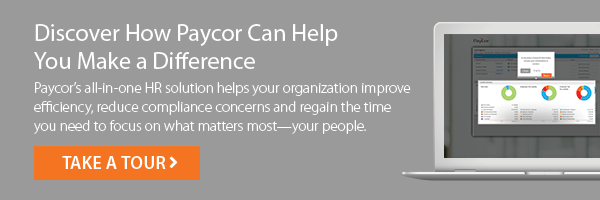Human Resources can mean a lot of different things. What’s required—and what you’re able to accomplish—will depend on your company, your industry and the technology you have available. In a small business, HR ‘teams of one’ often mostly play defense, doing their best to stay compliant, manage administrative tasks and just make sure employees are paid on time.
If you’re one of those people who ‘fell into HR’ you probably struggle to find time to improve other aspects of people management—like recruitment, scheduling and onboarding while focusing on core HR. The good news is, HR technology allows you to minimize manual tasks, so you can get out of the weeds and focus on the bigger picture.
However, it’s important to understand the basics of human resource management before you automate. Here are the 6 essential HR basics for small businesses—and how technology can help.
Compliance
When it comes to compliance, the buck stops with HR. American companies are governed by extensive, ever-evolving labor laws (at federal, state and local levels) that apply to all stages of the employment journey, from hiring to firing. There’s also a lot of paperwork to file, from I-9s to W-4s (and much more).
Human resource management teams are required to set clear policies and inform employees of all relevant rules and regulations—and more importantly, make sure they are followed.
How Paycor Helps: Automating repetitive admin tasks helps you avoid errors and keep up with essential paperwork. Our software is constantly updated in line with changing regulations while our team provides expertise and document templates so you know you can rely on your policies.
Recruitment
Finding and hiring top talent is a core human resource responsibility, especially for small businesses. It’s not a simple ask: you need to publicize job vacancies, filter candidates and then do background checks on whoever you choose—and you might even have to do all this remotely. What’s more, you need to be certain you’re avoiding discriminatory actions at any stage.
How Paycor Helps: Paycor Recruiting streamlines the entire recruitment process. Easily create a fully-branded careers site, post to job boards with one click and customize your online applications. Recruit with speed (on laptop or smartphone), conduct background checks you can rely on and—crucially—store all relevant documentation for compliance reporting.
Onboarding
Once you’ve hired a new employee, it’s also HR’s job to get them settled in. There are forms to complete, information to share and—most important of all—employees need to meet their teams and get ready to play an important role. The problem is, in a small business when human resource management consists of mostly manual tasks, employees are often expected to figure things out for themselves—which hurts their engagement, productivity and retention rates going forward. A successful onboarding process boosts the confidence of new employees by ensuring they have all of the information they need to get started in their role.
How Paycor Helps: Paycor Onboarding helps you give employees a great first impression. The key is to engage with employees before their first day with important company information, handbooks and other policies. Many forms can be completed electronically, reducing admin for HR teams and ensuring that when employees arrive at work they can fully concentrate on meeting their team.
Scheduling and Time Tracking
Creating schedules is yet another important task delegated to human resources. Employees need to know when they have to show up but just as important is ensuring efficient labor costs. This requires optimized schedules that avoid over-staffing or under-staffing. Then, you need to precisely track the hours employees work—plus any overtime, paid time off and sick leave.
How Paycor Helps: Paycor Scheduling lets you schedule (and re-schedule) your team quickly, even on smartphone. Create schedule templates to reduce admin, communicate information in real-time and facilitate easy shift-swapping. Paycor Time offers multiple methods for time entry, including mobile, web, kiosk and clock, helping you stay compliant and ensure accurate payroll data.
Payroll
Payroll processing is probably the most common HR task. This is a lot of responsibility, with small errors having serious consequences, for compliance, your employee relationships and a business’s bottom line. It can be a lot of work, too: collecting timesheets, calculating salaries (as well as taxes, liabilities and withholdings) and then making sure every is paid on time, every single pay period.
How Paycor Helps: Paycor Payroll’s intuitive and easy-to-use software makes it quick and easy to pay employees, wherever they are. Clear reporting makes it simple to spot inaccuracies while employee-service service reduces admin.
Performance Management
To ensure business needs are met, your employees’ performance should be measured at least once a year, although continuous feedback is much more effective. This function often falls under human resources teams to make sure managers reward top performers and provide resources to employees who are struggling. When performance management is done effectively, it can lead to higher engagement and retention.
How Paycor Helps: Paycor Talent Development eliminates the frustration of managing once-a-year manual employee performance evaluations by helping leaders collect feedback all year and compiling the results.
Much, Much More
Of course, beyond the basics, there are many other areas where HR can play a big role—like crafting the perfect benefits packages and analyzing competitive compensation data, or boosting learning and development, so your people keep growing during their tenure.
It’s also HR’s job to track employee engagement, improve retention and boost company culture—especially in a remote environment. As a business grows, HR can use analytics and reporting to better understand how the organization works and impact the bottom line. Every small business has different needs and these expand as you grow. Paycor’s suite of products provides the expertise and technology HR teams need to make a difference—now and in the future. Whether you’re focusing on the HR basics or are tasked with tackling every possible aspect of HR, we have you covered.









